1~45 item / All 55 items
Displayed results
Filter by category
Added to bookmarks
Bookmarks listBookmark has been removed
Bookmarks listYou can't add any more bookmarks
By registering as a member, you can increase the number of bookmarks you can save and organize them with labels.
Free membership registration
Contact this company
Contact Us Online1~45 item / All 55 items
Filter by category
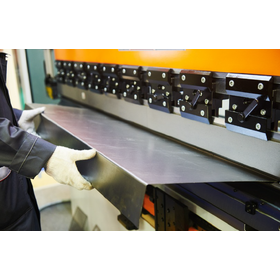
In product development, "sheet metal prototyping" plays an important role in structural confirmation, design verification, and internal approval. However, if there is a vague understanding of "what sheet metal prototyping is," or if knowledge about the differences from simple molds, each area of expertise, and connections to mass production processes is insufficient, it may lead to the inability to select suitable processing methods. This article will explain the overview of sheet metal prototyping, the differences from simple molds, and specific methods to achieve short lead times and high precision. *For detailed content of the article, please refer to the PDF document. For more information, feel free to contact us.*
Added to bookmarks
Bookmarks listBookmark has been removed
Bookmarks listYou can't add any more bookmarks
By registering as a member, you can increase the number of bookmarks you can save and organize them with labels.
Free membership registration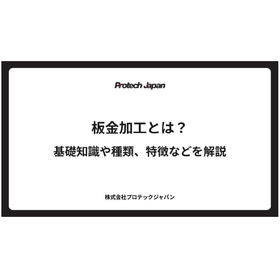
Sheet metal processing is a technology that involves cutting, bending, and drilling thin metal sheets to manufacture products and parts of various shapes. From automotive components to electronic device housings and construction materials, sheet metal processing technology is utilized in many products around us. In this article, we will explain the basics of sheet metal processing, specific processing methods, advantages and disadvantages, as well as points for improving quality. *For detailed content of the article, you can view it in the PDF document. Please feel free to contact us for more information.*
Added to bookmarks
Bookmarks listBookmark has been removed
Bookmarks listYou can't add any more bookmarks
By registering as a member, you can increase the number of bookmarks you can save and organize them with labels.
Free membership registration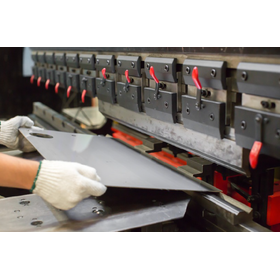
In the manufacturing industry, as the demand for short delivery times and small-lot production of various types increases, there is growing attention on "flexible and speedy processing methods" such as precision sheet metal processing and simple molds. That said, there are not a few cases where people stumble on basic aspects such as "What is precision sheet metal?" and "What is the difference from simple molds?" This article will explain the overview of precision sheet metal processing and its differences from simple molds. *For detailed content of the article, you can view it in the PDF document. Please feel free to contact us for more information.*
Added to bookmarks
Bookmarks listBookmark has been removed
Bookmarks listYou can't add any more bookmarks
By registering as a member, you can increase the number of bookmarks you can save and organize them with labels.
Free membership registration
In the manufacturing industry, vacuum casting is one of the important manufacturing methods for prototype development and small-lot production. Vacuum casting allows for the production of high-quality resin products in a short lead time while keeping the costs of mold production low, making it an effective option for balancing speed in product development and cost reduction. This article will clearly explain the basic mechanism of vacuum casting, as well as its advantages and disadvantages. *For detailed content of the article, please refer to the PDF document. For more information, feel free to contact us.*
Added to bookmarks
Bookmarks listBookmark has been removed
Bookmarks listYou can't add any more bookmarks
By registering as a member, you can increase the number of bookmarks you can save and organize them with labels.
Free membership registration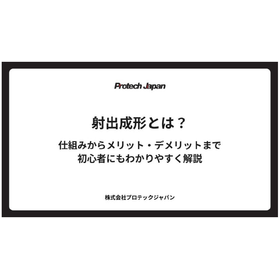
"Injection molding," widely used in the manufacturing industry, is an essential processing technology for the mass production of plastic products. However, surprisingly few people may have a precise understanding of its mechanisms and characteristics. In this article, we will explain the basic mechanisms of injection molding, its advantages and disadvantages, and how it differs from other molding methods in a way that is easy for beginners to understand. If you are considering improving production efficiency or optimizing costs, please use this as a reference. *You can view the detailed content of the article in the PDF materials. For more information, please feel free to contact us.*
Added to bookmarks
Bookmarks listBookmark has been removed
Bookmarks listYou can't add any more bookmarks
By registering as a member, you can increase the number of bookmarks you can save and organize them with labels.
Free membership registration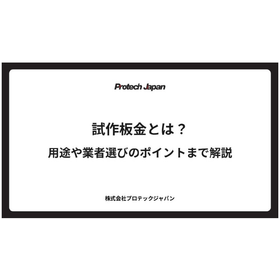
In the manufacturing industry, the production of prototypes is an essential process when developing new products or improving existing ones. This is especially true in product development that uses metal components, where "prototype sheet metal" plays an important role. However, the specific content and utilization methods of prototype sheet metal, as well as how to choose the right vendors, are often not well understood. This article will comprehensively explain the basic concepts of prototype sheet metal, practical utilization methods, and key points for selecting reliable vendors. By choosing the right prototype sheet metal partner, you can achieve greater efficiency in product development and optimize costs. *For detailed content of the article, please refer to the PDF document. For more information, feel free to contact us.*
Added to bookmarks
Bookmarks listBookmark has been removed
Bookmarks listYou can't add any more bookmarks
By registering as a member, you can increase the number of bookmarks you can save and organize them with labels.
Free membership registration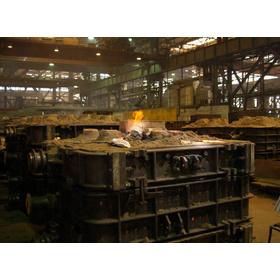
This article explains the definition and manufacturing process of sand casting, the materials used, and the differences from other casting methods, which are widely utilized in the industrial sector. By understanding why sand casting is essential for modern manufacturing, we hope it will serve as a reference when selecting the appropriate casting method for your company's products. *For detailed content of the article, you can view it in the PDF document. Please feel free to contact us for more information.*
Added to bookmarks
Bookmarks listBookmark has been removed
Bookmarks listYou can't add any more bookmarks
By registering as a member, you can increase the number of bookmarks you can save and organize them with labels.
Free membership registration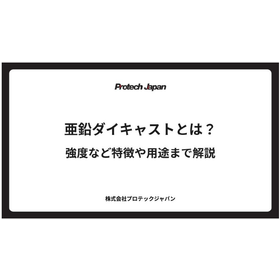
Zinc die casting is attracting attention as a casting technology that can achieve excellent dimensional accuracy and surface quality, and it is also capable of manufacturing complex-shaped parts that are difficult to achieve with sheet metal processing. In this article, we will provide a detailed explanation of the essential features of zinc die casting, its strength characteristics, and specific applications, highlighting the key points that those in the manufacturing industry should be aware of. *For detailed content of the article, please refer to the PDF document. Feel free to contact us for more information.*
Added to bookmarks
Bookmarks listBookmark has been removed
Bookmarks listYou can't add any more bookmarks
By registering as a member, you can increase the number of bookmarks you can save and organize them with labels.
Free membership registration
The lost wax casting method is an excellent precision casting technology that allows for the high-precision manufacturing of metal parts with complex shapes. In this article, we will provide an easy-to-understand explanation for beginners, covering everything from the basic mechanism of the lost wax casting method to specific processes such as creating wax models, embedding them in molds, removing the wax, and injecting metal, as well as the advantages and disadvantages. *For detailed content of the article, you can view it in the PDF document. Please feel free to contact us for more information.*
Added to bookmarks
Bookmarks listBookmark has been removed
Bookmarks listYou can't add any more bookmarks
By registering as a member, you can increase the number of bookmarks you can save and organize them with labels.
Free membership registration
This article explains die-cast materials, which are essential for product development and component selection, covering everything from basic principles to specific applications. By comparing each material in terms of lightweight properties, strength, and cost, you will understand how to select the most suitable material for your objectives and applications. By reading this article, you will gain knowledge on choosing the right materials, leading to improved product performance and cost optimization. *For detailed content of the article, you can view the PDF document. Please feel free to contact us for more information.*
Added to bookmarks
Bookmarks listBookmark has been removed
Bookmarks listYou can't add any more bookmarks
By registering as a member, you can increase the number of bookmarks you can save and organize them with labels.
Free membership registration
In the manufacturing industry, die casting is essential for mass production of metal parts. It is known for its high productivity and excellent cost performance, but surprisingly few people may have a precise understanding of its accuracy characteristics. In this article, we will explain the accuracy of die casting and also introduce its advantages and disadvantages. *For detailed content of the article, please refer to the PDF document. Feel free to contact us for more information.*
Added to bookmarks
Bookmarks listBookmark has been removed
Bookmarks listYou can't add any more bookmarks
By registering as a member, you can increase the number of bookmarks you can save and organize them with labels.
Free membership registration
Gravity casting is one of the important techniques for manufacturing metal parts in the manufacturing industry. This technique is often confused with die casting, but each has its own characteristics, and the appropriate use depending on the application greatly affects product quality and cost efficiency. In this article, we will explain the essential points to understand, from the basics of gravity casting to the differences from die casting, as well as the advantages and disadvantages. *For detailed content of the article, you can view it in the PDF document. Please feel free to contact us for more information.*
Added to bookmarks
Bookmarks listBookmark has been removed
Bookmarks listYou can't add any more bookmarks
By registering as a member, you can increase the number of bookmarks you can save and organize them with labels.
Free membership registration
In strengthening the competitiveness of the manufacturing industry, injection molding technology for engineering plastics (known as "empura") plays an important role. While it enables the production of high-performance and high-functionality parts, it also requires the optimization of molding conditions and quality control that differ from those of general-purpose plastics. This article will explain the fundamental knowledge of injection molding of engineering plastics, important points during molding, common challenges faced on-site, and their solutions. *For detailed content of the article, please refer to the PDF document. For more information, feel free to contact us.*
Added to bookmarks
Bookmarks listBookmark has been removed
Bookmarks listYou can't add any more bookmarks
By registering as a member, you can increase the number of bookmarks you can save and organize them with labels.
Free membership registration
In strengthening the competitiveness of the manufacturing industry, injection molding technology for engineering plastics (known as "empura") plays an important role. While it enables the production of high-performance and high-functionality parts, it also requires the optimization of molding conditions and quality control that differ from those of general-purpose plastics. This article will explain the basic knowledge of injection molding of engineering plastics, important points during the molding process, common challenges faced on-site, and their solutions. *For detailed content of the article, please refer to the PDF document. For more information, feel free to contact us.*
Added to bookmarks
Bookmarks listBookmark has been removed
Bookmarks listYou can't add any more bookmarks
By registering as a member, you can increase the number of bookmarks you can save and organize them with labels.
Free membership registration
In the early stages of product development, "prototyping" to bring ideas to life is an essential process for manufacturing companies. However, when asked, "What is prototyping?" there may be surprisingly few sales representatives who can explain the specific content and processes involved. In recent years, as there is a demand for quick turnaround and low-cost prototypes, methods such as "simple die casting" and "simple molds" have gained attention. This article will present an easy-to-understand overview of prototyping, from the basics to the potential for product validation using simple die casting, from the perspective of sales representatives. *For detailed content of the article, please refer to the PDF document. For more information, feel free to contact us.*
Added to bookmarks
Bookmarks listBookmark has been removed
Bookmarks listYou can't add any more bookmarks
By registering as a member, you can increase the number of bookmarks you can save and organize them with labels.
Free membership registration
In the field of product development, it is essential to select suitable processing methods and materials while considering the balance of cost, performance, and delivery time. Among these, "die casting" is a processing method that allows for the precise and high-volume production of complex-shaped metal parts, and it is adopted by many industries. However, when we talk about "die casting materials," there are multiple options such as aluminum alloys and zinc alloys, each with different characteristics and suitability. In this article, based on the theme of "die casting materials," we will organize the features of representative metal materials and explain the points for differentiation based on their applications. We will present this information in an easy-to-understand manner so that sales representatives can confidently select materials and make customer proposals. *For detailed content of the article, please refer to the PDF document. For more information, feel free to contact us.
Added to bookmarks
Bookmarks listBookmark has been removed
Bookmarks listYou can't add any more bookmarks
By registering as a member, you can increase the number of bookmarks you can save and organize them with labels.
Free membership registration
Among metal processing products, aluminum material is widely used in many industries due to its lightweight and excellent workability. However, in its raw form, it is susceptible to corrosion and wear, making surface protection necessary in many situations. In such cases, "anodizing" is often chosen. This article will carefully explain the basic mechanism of anodizing, its applications, features, and combinations with simple die casting, in a way that is easy for beginners to understand. *For detailed content of the article, please refer to the PDF document. For more information, feel free to contact us.
Added to bookmarks
Bookmarks listBookmark has been removed
Bookmarks listYou can't add any more bookmarks
By registering as a member, you can increase the number of bookmarks you can save and organize them with labels.
Free membership registration
A core is a replaceable part incorporated within a mold, and it is an important component that mainly constitutes a part of the molded product. In the design and manufacturing of molds, the adoption of a core structure plays a significant role in improving maintainability, accommodating changes in product shape, and optimizing productivity. For companies dealing with simple die casting, simple molds, and gypsum casting, knowledge of cores is directly linked to proposals for customers and the optimization of production processes. This article will clearly explain the basic structure of cores, types, advantages and disadvantages, points to consider during design, and comparisons with other manufacturing technologies. It will provide content that serves as a tool for the sales department when discussing technical matters with customers. *For detailed content of the article, please refer to the PDF document. For more information, feel free to contact us.
Added to bookmarks
Bookmarks listBookmark has been removed
Bookmarks listYou can't add any more bookmarks
By registering as a member, you can increase the number of bookmarks you can save and organize them with labels.
Free membership registration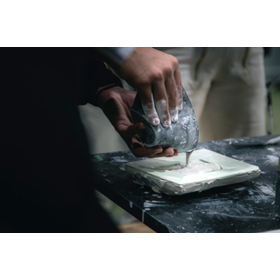
In the manufacturing industry, selecting the appropriate casting method is essential for producing high-precision metal parts. There are various types of casting technologies, among which "gypsum casting" is known for its excellent reproducibility of precise shapes and is suitable for small lot production and prototype manufacturing. On the other hand, "die casting" is a technology suited for mass production, while "simple molds" offer the ability to create prototypes with short lead times and low costs, each possessing distinct characteristics. This article will explain the basic concepts and manufacturing processes of gypsum casting, and will provide a detailed comparison with die casting and simple molds. Additionally, it will introduce the suitable applications for each technology, taking into account their respective advantages and disadvantages. *For detailed content of the article, please refer to the PDF document. For more information, feel free to contact us.*
Added to bookmarks
Bookmarks listBookmark has been removed
Bookmarks listYou can't add any more bookmarks
By registering as a member, you can increase the number of bookmarks you can save and organize them with labels.
Free membership registration
Precision casting is an essential processing technology for manufacturing parts that require complex shapes and high precision. In recent years, the domestic manufacturing industry has been seeking to improve production efficiency and quality in response to labor shortages and rising raw material costs. Additionally, there is a growing interest in processing technologies that achieve energy savings and cost reductions, driven by stricter environmental regulations and intensified global competition. This article will clearly explain the basic knowledge and characteristics of precision casting, providing useful information for sales representatives in their proposal activities. *For detailed content of the article, please refer to the PDF materials. For more information, feel free to contact us.*
Added to bookmarks
Bookmarks listBookmark has been removed
Bookmarks listYou can't add any more bookmarks
By registering as a member, you can increase the number of bookmarks you can save and organize them with labels.
Free membership registration
In the manufacturing industry, improving the efficiency of small lot production and reducing prototype costs are significant challenges. Particularly in traditional manufacturing processes using injection molding and die casting, the cost of mold production can be high, and it may be difficult to respond to short delivery times. This is where the technology of "vacuum casting" comes into focus. Vacuum casting is a method that utilizes 3D printers and master molds to enable the rapid production of high-quality prototypes and small quantities. This technology is well-suited for prototyping and small lot production of resin parts and rubber products, achieving improvements in development speed and cost reduction. This article will explain in detail the mechanism, benefits, and case studies of vacuum casting, exploring its potential as an optimal solution for small lot production in the manufacturing industry. *For detailed content of the article, please refer to the PDF document. For more information, feel free to contact us.*
Added to bookmarks
Bookmarks listBookmark has been removed
Bookmarks listYou can't add any more bookmarks
By registering as a member, you can increase the number of bookmarks you can save and organize them with labels.
Free membership registration
Prototyping is an essential process for confirming accuracy and functionality in the early stages of product development. In particular, it is important for sales representatives to have a basic understanding of prototyping when proposing cost reductions or shortened delivery times. In recent years, the manufacturing industry has faced challenges such as labor shortages and rising raw material costs, making the selection of efficient prototyping methods necessary. Additionally, with an emphasis on environmental considerations and energy conservation, the ability to propose optimal processing methods is being called into question. This article will clearly explain the basics of prototyping, key points for selecting methods that lead to cost reductions, and practical examples. *For detailed content of the article, please refer to the PDF document. For more information, feel free to contact us.*
Added to bookmarks
Bookmarks listBookmark has been removed
Bookmarks listYou can't add any more bookmarks
By registering as a member, you can increase the number of bookmarks you can save and organize them with labels.
Free membership registration
The light curing 3D printer is an innovative manufacturing technology that uses ultraviolet light or lasers to harden liquid resin and create precise models. In recent years, the demand for rapid prototyping and complex shape modeling has increased in the domestic manufacturing industry, leading to a rise in the use of light curing 3D printers. Particularly for companies that provide simple die casting and gypsum casting, it is important to understand the advantages and disadvantages compared to traditional manufacturing methods. This article will provide a detailed explanation of the basic principles, features, and the advantages and disadvantages of introducing light curing 3D printers, as well as a comparison with simple die casting and gypsum casting. We aim to provide sales representatives with the information needed to make optimal proposals. *For detailed content of the article, please refer to the PDF document. For more information, feel free to contact us.*
Added to bookmarks
Bookmarks listBookmark has been removed
Bookmarks listYou can't add any more bookmarks
By registering as a member, you can increase the number of bookmarks you can save and organize them with labels.
Free membership registration
Metal 3D printers are an innovative manufacturing technology that creates three-dimensional objects using metal powder. In recent years, they have gained attention in the domestic manufacturing industry as a new option alongside simple die casting, simple molds, and gypsum casting. They particularly demonstrate high performance in applications such as rapid prototyping, the creation of complex shapes in one piece, and mass production of customized products. Metal 3D printers are utilized across a wide range of industries, including automotive, aerospace, and medical fields, and it is expected that the market size will expand in Japan by 2025. This article will provide a detailed explanation of the basic principles, features, applications, advantages and disadvantages of introducing metal 3D printers, as well as simple die casting. It also covers key points for sales representatives when making introduction proposals, so please use it as a reference. *For detailed content of the article, please refer to the PDF materials. For more information, feel free to contact us.*
Added to bookmarks
Bookmarks listBookmark has been removed
Bookmarks listYou can't add any more bookmarks
By registering as a member, you can increase the number of bookmarks you can save and organize them with labels.
Free membership registration
As the use of 3D printers advances, many companies may be struggling with the question of "which material should we choose?" There are many types of materials for 3D printers, including metals and resins, each with different characteristics and applications. For example, metals are used for parts that require strength in the production of prototype models. The demand for 3D printer materials is also expanding in the domestic market, and according to the latest market forecasts, the 3D printer-related market is expected to grow significantly by 2025 (Source: Fuji Economic Research). With this market growth, the appropriate selection of materials has become directly linked to enhancing a company's competitiveness. This article will provide a detailed explanation of the representative materials used in 3D printing (metals and resins), along with their characteristics and applications. We will also introduce specific case studies and tips on how to choose materials so that sales representatives can make the best proposals to their clients. *For detailed content of the article, please refer to the PDF document. For more information, feel free to contact us.*
Added to bookmarks
Bookmarks listBookmark has been removed
Bookmarks listYou can't add any more bookmarks
By registering as a member, you can increase the number of bookmarks you can save and organize them with labels.
Free membership registration
At Protech Japan, we are confident in our technology and know-how for "surface treatment" tailored to molding conditions and materials. When focusing on paint adhesion and attachment, or to prevent color unevenness caused by differences in surface roughness, we propose appropriate finishing methods based on customer requests and material conditions. Additionally, by applying treatment agents to the surface to induce chemical reactions, we also perform "chemical treatment," which imparts different properties, such as corrosion resistance and compatibility with paints, compared to the original material. 【Main Finishing Processes】 ■ Shot blasting ■ Vibratory barrel polishing ■ Magnetic barrel polishing ■ Buff polishing ■ Hairline, etc. *For more details, please download the PDF or feel free to contact us.
Added to bookmarks
Bookmarks listBookmark has been removed
Bookmarks listYou can't add any more bookmarks
By registering as a member, you can increase the number of bookmarks you can save and organize them with labels.
Free membership registration
We supply the core parts of mold bases produced in prototypes as molded products tailored to the order shapes of each manufacturer. The product sizes we accommodate are for 50t, 100t, and 150t, with the maximum dimensions being (width) 140 × (length) 250 × (height) 40. The maximum dimensions may vary due to slide mechanisms and other factors. For multiple product inquiries, we can accommodate even if the maximum dimensions are exceeded. 【Features】 ■ Achieves cost reduction by sharing mold bases ■ Reduced processing numbers due to sharing, allowing for shorter delivery times ■ No need to account for mold assets; can be accounted for as processing jigs (Amortization is recommended based on the initial sample quantity) *For more details, please download the PDF or feel free to contact us.
Added to bookmarks
Bookmarks listBookmark has been removed
Bookmarks listYou can't add any more bookmarks
By registering as a member, you can increase the number of bookmarks you can save and organize them with labels.
Free membership registration
We manufacture prototypes and sample products using "vacuum casting," which can also be utilized for test molding before mold creation. Since this method does not use molds, it leads to shorter delivery times and cost reductions. In addition to prototypes, we also accommodate small lot and diverse production, so please feel free to consult with us. 【Molding of Resin Products】 ■ Injection Molding (Injection) & Two-color Molding ■ Blow Molding & Rotational Molding ■ Vacuum & Pressure Molding ■ Small Lot Resin Molding *For more details, please download the PDF or feel free to contact us.
Added to bookmarks
Bookmarks listBookmark has been removed
Bookmarks listYou can't add any more bookmarks
By registering as a member, you can increase the number of bookmarks you can save and organize them with labels.
Free membership registration
Protech Japan Co., Ltd. offers both "vacuum forming and pressure forming." We can perform "vacuum forming," where thermoplastic resin sheets are heated and softened, then stretched with air pressure to closely adhere to a mold, and "pressure forming," where compressed air pressure is used to closely adhere to the mold. Please feel free to contact us for any inquiries or questions. 【Molding of Resin Products】 ■ Injection Molding (2-color molding) ■ Blow Molding / Rotational Molding ■ Casting ■ Small Lot Resin Molding *For more details, please download the PDF or feel free to contact us.
Added to bookmarks
Bookmarks listBookmark has been removed
Bookmarks listYou can't add any more bookmarks
By registering as a member, you can increase the number of bookmarks you can save and organize them with labels.
Free membership registration
We offer molding of resin products, including injection molding, two-color molding, insert molding, blow molding, and rotational molding. For small lot resin molding, we supply molded products with the insert part of the mold base shaped to order. Additionally, we also perform vacuum forming and pressure forming, which are thermal molding methods, as well as casting by pouring resin into silicone molds to create replicas. 【Services Offered】 ■ Injection Molding / Two-Color Molding ■ Blow Molding / Rotational Molding ■ Vacuum / Pressure Forming ■ Casting ■ Small Lot Resin Molding *For more details, please refer to the related links or feel free to contact us.
Added to bookmarks
Bookmarks listBookmark has been removed
Bookmarks listYou can't add any more bookmarks
By registering as a member, you can increase the number of bookmarks you can save and organize them with labels.
Free membership registration
We accept prototype and other processing services such as small lot die casting, gypsum casting, and machining. We can produce prototypes and samples using vacuum casting, as well as small lot production, machining after extrusion, and surface treatment, all in a comprehensive manner. Additionally, we have incorporated light curing technology early on and have received high praise from our customers. 【Services Offered (Partial)】 ■ Small lot die casting ■ Gypsum casting ■ Machining ■ Casting ■ Light curing (3D printing) *For more details, please refer to the related links or feel free to contact us.
Added to bookmarks
Bookmarks listBookmark has been removed
Bookmarks listYou can't add any more bookmarks
By registering as a member, you can increase the number of bookmarks you can save and organize them with labels.
Free membership registration
We consistently provide precision casting products and die casting that are suitable for our customers' needs, as well as the design and manufacturing of various molds. We propose appropriate casting methods based on your requests and conditions, such as which materials to use, how much to produce, and when the delivery date is. We strive to create high-quality and precise products. Additionally, please feel free to consult us regarding small lots or delivery dates. 【Product Information (Partial)】 ■ Small Lot Die Casting ■ Gypsum Casting ■ Die Casting ■ Sand Casting ■ Gravity Casting *For more details, please refer to the related links or feel free to contact us.
Added to bookmarks
Bookmarks listBookmark has been removed
Bookmarks listYou can't add any more bookmarks
By registering as a member, you can increase the number of bookmarks you can save and organize them with labels.
Free membership registration
Trial molds, simple molds, and small lot die casting refer to manufacturing methods suitable for producing prototypes and mass production in quantities of around 50 to 100 using die casting. Our company achieves short delivery times and low costs through our unique "MC Process." We carefully create a beautiful casting surface and finish small lots with the same precision as mass production processes. For example, a product that typically takes about 35 days and costs around 1 million yen to produce using standard die casting can be reduced to about two-thirds of the time and approximately half the cost using our unique process. Please feel free to contact us when you need assistance. [Reasons for Short Delivery Times] - Direct processing through the transition from CAD to CAM - Smooth CAD conversion due to high casting technology and know-how - Efficient information exchange in CAD, leading to quicker mutual understanding with customers - While electrical discharge machining is commonly used in mold production, we eliminate electrode production and electrical discharge machining, processing everything directly with MC. *For more details, please refer to the related links or feel free to contact us.
Added to bookmarks
Bookmarks listBookmark has been removed
Bookmarks listYou can't add any more bookmarks
By registering as a member, you can increase the number of bookmarks you can save and organize them with labels.
Free membership registration
Trial molds, simple molds, and small lot die casting refer to manufacturing methods suitable for producing prototypes and mass production in quantities of about 50 to 100 using die casting. Our company achieves short delivery times and low costs through our unique "MC Process." We carefully create a beautiful casting surface and finish small lots with the same precision as mass production processes. For example, a product that typically takes about 35 days and costs around 1 million yen to produce using standard die casting can be reduced to about two-thirds of the time and approximately half the cost using our unique process. Please feel free to contact us when you need our services. 【Reasons for Short Delivery Times】 - Direct processing through the transition from CAD to CAM - Smooth CAD conversion due to high casting technology and know-how - Smooth information exchange of CAD facilitates mutual understanding with customers - Although electrical discharge machining is commonly used in mold manufacturing, we eliminate electrode production and electrical discharge machining, processing everything directly with MC. *For more details, please refer to the related links or feel free to contact us.
Added to bookmarks
Bookmarks listBookmark has been removed
Bookmarks listYou can't add any more bookmarks
By registering as a member, you can increase the number of bookmarks you can save and organize them with labels.
Free membership registration
We offer low-cost production of prototypes and small lots for "gypsum casting" according to the required quality. Gypsum casting is commonly used for prototype manufacturing, but we can also accommodate small lot production. Additionally, we can produce rubber molding molds, injection molding molds, vacuum forming molds, and blow molding molds using aluminum materials. Please feel free to contact us. 【Features】 ■ Short delivery time and low cost ■ High precision ■ High quality *For more details, please refer to the related links or feel free to contact us.
Added to bookmarks
Bookmarks listBookmark has been removed
Bookmarks listYou can't add any more bookmarks
By registering as a member, you can increase the number of bookmarks you can save and organize them with labels.
Free membership registration
We offer low-cost production of prototypes and small lots for "gypsum casting" according to the required quality. Gypsum casting is commonly used for prototype manufacturing, but we can also accommodate small lot production. Additionally, we can produce rubber molding molds, injection molding molds, vacuum forming molds, and blow molding molds using aluminum materials. Please feel free to contact us. 【Features】 ■ Short lead time and low cost ■ High precision ■ High quality *For more details, please refer to the related links or feel free to contact us.
Added to bookmarks
Bookmarks listBookmark has been removed
Bookmarks listYou can't add any more bookmarks
By registering as a member, you can increase the number of bookmarks you can save and organize them with labels.
Free membership registration
At Protech Japan, we have been handling a large number of "die casts" for many years, allowing us to provide high-precision and high-quality "die casts" at short lead times and low costs, tailored to the required quality. Additionally, we can manufacture molds that enable a smooth transition to mass production by gathering information on the characteristics and evaluations of castings used in prototypes, including gypsum. This technical capability is one of our strengths. Furthermore, through our network of partner companies both domestically and internationally, we can accommodate die casts ranging from 3mm to 800mm. [Features] - Extensive delivery record in the telecommunications and optical components industries - Ability to manufacture molds that facilitate a smooth transition to mass production - Support for die casts ranging from 3mm to 800mm *For more details, please refer to the related links or feel free to contact us.
Added to bookmarks
Bookmarks listBookmark has been removed
Bookmarks listYou can't add any more bookmarks
By registering as a member, you can increase the number of bookmarks you can save and organize them with labels.
Free membership registration
The casting method of pouring melted alloy into a mold made of sand and solidifying it is called "sand casting." In the past, wooden molds were predominant, but our company proposes appropriate materials, including durable resins, to meet customer needs. We provide total solutions for customer concerns and requests related to "sand casting," addressing common issues with cast products, as well as offering heat treatment, machining, and surface treatment. 【Features】 ■ Low cost ■ Quick response for product launches ■ Capable of handling a wide range of products, including large items ■ Suitable for prototypes and small lot production ■ A wide selection of steel materials available *For more details, please refer to the related links or feel free to contact us.
Added to bookmarks
Bookmarks listBookmark has been removed
Bookmarks listYou can't add any more bookmarks
By registering as a member, you can increase the number of bookmarks you can save and organize them with labels.
Free membership registration
"Gravity" (aluminum die casting) is a casting method that involves pouring molten aluminum alloy into a mold and shaping the product using the weight of the aluminum itself. It is easy to automate and can produce products with excellent internal quality. This method allows for superior precision and hardness, resulting in products with a good surface finish, achieving quality that surpasses sand castings. Our company accommodates a wide range of sizes from 100g to 80kg. Even for two-dimensional products that require strength, we can create products with a dense structure by adopting a one-step forging press finishing method. 【Features】 ■ High precision and smooth surface finish ■ Suitable for the production of intricate molds ■ Capable of mass production *For more details, please refer to the related links or feel free to contact us.
Added to bookmarks
Bookmarks listBookmark has been removed
Bookmarks listYou can't add any more bookmarks
By registering as a member, you can increase the number of bookmarks you can save and organize them with labels.
Free membership registration
"Lost wax" is a type of precision casting that achieves significantly high dimensional accuracy and beautiful surface finish. Additionally, it has the potential to reduce costs through process integration of multiple parts, and precision casting of titanium is also possible. At our company, we provide total solutions to our customers' concerns and requests, including not only materials but also appropriate processing and surface treatment that meet their needs. [Features] ■ Achieves high dimensional accuracy and beautiful surface finish ■ A wide selection of steel materials, easy material changes ■ Affordable molds, capable of handling complex shapes *For more details, please refer to the related links or feel free to contact us.
Added to bookmarks
Bookmarks listBookmark has been removed
Bookmarks listYou can't add any more bookmarks
By registering as a member, you can increase the number of bookmarks you can save and organize them with labels.
Free membership registration
Metal Injection Molding (MIM) is a processing method that involves mixing metal powder in a powdered form with a binder, injecting it into a mold, and then sintering it after debinding to manufacture metal products. It achieves high precision and beautiful finishes even for insert molding, small holes, and complex shapes. Additionally, it can accommodate complex shapes and three-dimensional curves. It is also suitable for manufacturing thin and slender items. 【Features】 - Insert molding is possible - Suitable for small products, capable of complex shapes and three-dimensional curves - Beautiful surface finish - High precision - No casting defects - Reduction in processing time *For more details, please refer to the related links or feel free to contact us.
Added to bookmarks
Bookmarks listBookmark has been removed
Bookmarks listYou can't add any more bookmarks
By registering as a member, you can increase the number of bookmarks you can save and organize them with labels.
Free membership registration
Our castings provide customers with peace of mind and satisfaction through quality and precision that truly reflect Japanese standards, backed by years of accumulation and research and development. We manufacture industrial parts from various types of aluminum alloys, accommodating items ranging from small pieces weighing a few hundred grams to those around one ton. We have a proven track record in aluminum cast parts that require stable high quality, from industrial products such as automotive engines to FA robots and large equipment operating on factory lines. With our accumulated casting knowledge and technology, we also offer proposals for efficient casting. 【Equipment Owned (Partial)】 ■ Molding Facilities - Fran organic self-hardening sand treatment plant - Toyo Casting Machine sand treatment plant (5t/h) - Toyo Casting Machine chemical flow mixer (5t/h) ■ Finishing Facilities - Band saw - Shot blast machine (250k) *For more details, please refer to the related links or feel free to contact us.
Added to bookmarks
Bookmarks listBookmark has been removed
Bookmarks listYou can't add any more bookmarks
By registering as a member, you can increase the number of bookmarks you can save and organize them with labels.
Free membership registration
Our company uses NC automatic lathes to handle everything from general cutting parts to ultra-precision cutting parts, including difficult-to-cut materials such as stainless steel and titanium. We can process various materials, including metals, resins (general-purpose resins and engineering plastics), and additional processing of castings such as aluminum, zinc, and magnesium. Utilizing the know-how gained from many years of tire mold manufacturing, we are also capable of molding and cutting various types of rubber. We are open to consultations regarding shapes and lot sizes, so please feel free to reach out to us. 【Features】 ■ Capable of handling prototypes and small lot cutting ■ Capable of molding and cutting various metal, resin, and rubber products *For more details, please refer to the related links or feel free to contact us.
Added to bookmarks
Bookmarks listBookmark has been removed
Bookmarks listYou can't add any more bookmarks
By registering as a member, you can increase the number of bookmarks you can save and organize them with labels.
Free membership registration
Protech Japan manufactures prototypes and sample products using vacuum casting. Vacuum casting is a method where a silicone mold created from a master model is placed in a near-vacuum state, and resin is poured into it to create the product. Since it does not use molds, it leads to shorter delivery times and cost reductions. 【Features】 ■ Suitable for prototypes, small lots, and diverse production ■ Lower cost compared to molds, with shorter delivery times possible ■ Can also be used for test molding before mold creation *For more details, please refer to the related links or feel free to contact us.
Added to bookmarks
Bookmarks listBookmark has been removed
Bookmarks listYou can't add any more bookmarks
By registering as a member, you can increase the number of bookmarks you can save and organize them with labels.
Free membership registration
Protech Japan manufactures prototypes and sample products using vacuum casting. Vacuum casting is a method where a silicone mold created from a master model is placed in a near-vacuum state, and resin is poured into it to create the product. Since it does not use molds, it leads to shorter delivery times and cost reductions. 【Features】 ■ Suitable for prototypes, small lots, and diverse production ■ Lower cost compared to molds, with possible short delivery times ■ Can also be used for test molding before mold creation *For more details, please refer to the related links or feel free to contact us.
Added to bookmarks
Bookmarks listBookmark has been removed
Bookmarks listYou can't add any more bookmarks
By registering as a member, you can increase the number of bookmarks you can save and organize them with labels.
Free membership registration